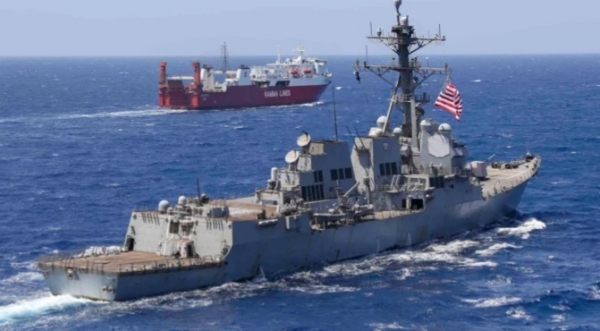The Washington Post reported that the withdrawal of the aircraft carrier USS Abraham Lincoln has sparked concerns about the U.S. military’s capacity to address growing threats amid an ongoing conflict in the Middle East, especially as the U.S. faces significant ammunition depletion due to confrontations with Sana’a forces in the Red Sea.
The report, published on Wednesday, stated that “the ongoing crisis in the Middle East is putting pressure on the U.S. Department of Defense, heightening concerns about the U.S. military’s ability to balance immediate threats to American interests in the region with longer-term objectives, as both Russia and China test Washington elsewhere.”
The article noted signs of this strain in recent days with the decision to withdraw the only American aircraft carrier in the region, the USS Abraham Lincoln. When the Lincoln departs in the coming days, the Department of Defense will rely instead on a mix of other forces, including Navy destroyers, B-52 bombers, and land-based fighter aircraft, to support a broad, potentially combustible deterrence mission stretching from the eastern Mediterranean to the Persian Gulf and other volatile shipping routes around the Arabian Peninsula.
The Washington Post reported that this shift comes as the Pentagon also faces a shortage of critical munitions used to fend off Houthi attacks in Yemen, alongside helping Ukraine resist a Russian incursion that has now spanned nearly three years.
According to the report, U.S. military officials acknowledged their struggle to distribute sufficient air defense systems to protect assets and allies in Eastern Europe as well as those in the Middle East. Analysts have warned that this strain could hinder Washington’s ability to defend Taiwan should a Chinese invasion occur.
The report also cited concerns about the amphibious readiness group (ARG) centered around the USS Wasp, consisting of three ships carrying U.S. Marines, sailors, and various aircraft. Since late June, this group has been stationed in the eastern Mediterranean amid concerns over a potential American evacuation from Lebanon. These ships and their personnel have been deployed since April, and several defense officials familiar with the situation stated that there is no comparable backup ready to take over, largely due to the Navy’s long-standing struggle to maintain its modest fleet of such ships.
Retired Admiral James Foggo III commented in the report that these extended deployments would have “second-order effects,” including delayed maintenance, disrupted training schedules, and ammunition shortages.
He added, “Another two months of wear and tear on the ship means more things need fixing, and it’s critically important that we can repair the ship and get it back into circulation.”
The report further highlighted that, over the past year, the U.S. has spent at least $22.7 billion on military aid to Israel and U.S. operations in the region, according to a cost analysis by Brown University’s Watson Institute for International and Public Affairs. The authors of the analysis noted that this is a conservative estimate that does not include additional U.S. security aid provided to Egypt, Saudi Arabia, and other U.S. partners.
The analysis found that more than $4.8 billion has been spent on bolstering offensive and defensive operations in the Red Sea and Gulf of Aden, where the U.S. Navy has reportedly intercepted Houthi drones and missiles on an almost daily basis. The analysis described this as one of the most sustained military campaigns undertaken by U.S. forces since the peak of the Defense Department’s bombing campaign against ISIS in Iraq and Syria.
William D. Hartung, an analyst at the Quincy Institute for Responsible Statecraft, stated in the report that after years of operations in Iraq, Afghanistan, and other countries, the U.S. has shifted from maintaining ground forces to a strategy focused on arming allies and partners. However, he cautioned that “this could ultimately lead to catastrophic results.”
He added, “It’s not a secure substitute, as they had envisioned.”
The report also quoted Becca Wasser, a defense analyst at the Center for a New American Security, who said, “The Houthis appear to be waging a cost-imposition campaign aimed at exhausting the United States until it is forced to change its policy or withdraw.”
